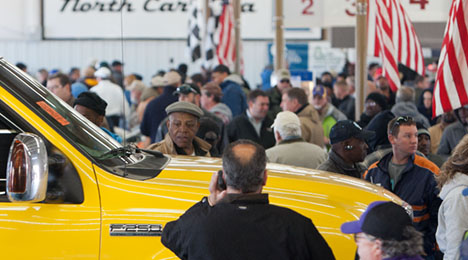Manheim COO: Tailoring to Dealer Needs Nets Gains

By subscribing, you agree to receive communications from Auto Remarketing and our partners in accordance with our Privacy Policy. We may share your information with select partners and sponsors who may contact you about their products and services. You may unsubscribe at any time.
NEW ORLEANS –
It might be a bit off-putting to hear that your customer base is looking for ways around your traditional business model. But in the case of the wholesale auto auction business, it may mean the chance to serve your customer base in a brand new way.
That’s the way that Manheim executive vice president and chief operating officer Janet Barnard sees it, and this philosophy is paying dividends for the auction company as it seeks to meets the evolving needs of the wholesale buyer and seller.
“I remember the day, clearly, the first time that I heard one of these customers — one of these larger groups — that we’ve had a great relationship with, say to us, ‘We love you, but we’re trying to find ways not to use you,’” Barnard said, referring to traditional process of buying and selling cars at auction.
“And so on the surface, you hear that and it can be a little disconcerting. But as we were starting to hear that, as a company, as a team, we said, ‘We want to participate in the transaction in whatever way the customer wants to do business.’ And that’s really been our whole mindset: doing business with the customer in the way they want to be served,” she told Auto Remarketing during an interview at the NADA Convention & Expo.
Barnard said such an approach “immediately starts to point out a host of opportunities — honestly, more opportunities than we can even take advantage of, quickly enough.”
This philosophy of tailoring your service to the specific demands of the customer is particularly evident in Manheim’s recent deal with Sonic Automotive.
Subscribe to Auto Remarketing to stay informed and stay ahead.
By subscribing, you agree to receive communications from Auto Remarketing and our partners in accordance with our Privacy Policy. We may share your information with select partners and sponsors who may contact you about their products and services. You may unsubscribe at any time.
Under that partnership, the company helps Sonic centralize their auction selling process through Manheim’s Remote Seller tool.
And this was something that the Sonic team was asking for to help improve how it “reps” cars at auction.
Sonic’s Retail Trade Center can rep cars remotely from Sonic’s centralized location in Charlotte, N.C. Doing so lets Sonic buy and sell vehicles simultaneously at the same auction, helping cut travel costs, save time and boost efficiency.
All aspects of the sale are controlled by the Sonic team, which can send instant messages in real time to the auction block and bidders. This is designed to give Sonic stronger quality control while at the same time letting them leverage inventory and maintain detailed management inventory throughout their 100 stores.
“The adaption rate has been incredible. They now centrally manage all of the units that they remarket with us, which is tens of thousands of cars via the system,” Susie Heins, Manheim’s vice president of dealer sales, told Auto Remarketing at NADA. “And the beauty of it is, the same team each week (is) using the same data points, knowing exactly what the inventory is going to bring and what it could bring, and they know the buyer base. And they’re managing it out of Charlotte.
“And the auctioneers and the buyers in the lanes are used to the process — it’s not really any different other than there’s not a physical person up there — and they like it,” she said.
Here’s the kicker: Heins says Sonic has increased conversion rates probably about 15 percentage points, pushing that number into the high 90s. That’s a historic plus for Manheim.
“No one thing we’ve ever done has moved the needle that much,” Barnard said.
Manheim uses its Remote Seller with many small accounts, but Sonic is the first of the dealer groups to utilize it. The auction company has “several more lined up,” Heins said.
Among those is Hendrick Automotive Group, which will likely roll it out later this year as part of the exclusive agreement it signed with Manheim.
That deal, of course, was another of the company’s blockbuster announcements at NADA.
Per the agreement, Manheim will be the primary resource for Hendrick at its 87 dealerships to remarket cars, be it online, at physical locations or via mobile.
Both the Hendrick and Sonic deals include all the channels of remarketing, but the Hendrick deal has a mobile element to it, Heins explained. Mobile in the sense of physically bringing the auction to the customer, that is.
“What that means is we’re going to bring the auction to a few of their superstore sites, in key areas where we may not have a physical location in a good proximity that makes sense for them,” Heins said.
The sale would still be facilitated via Manheim and broadcast through Simulcast. The mobile auction looks just like a typical Manheim sale, but it is hosted in one of the bays at the dealership.
For some reason, the concept of the mobile sale, Barnard said, has been concentrated for many years in the Carolinas (which is where Hendrick is headquartered and has many of its stores). But interest is spreading west, she said.
And there are other dealer groups who have shown interest, Heins said.
“We have a few opportunities in the pipeline with some other large groups; some of them are public; some of them are private. Same situation, where they want to centralize and have one partner, but then they also want to take advantage of the other pieces of it,” Heins said.
So, that all goes back to what Barnard mentioned about Manheim’s mindset creating prospects for business.
Some of the opportunities, she said, may still deal with buying and selling the car and physically running it down the lanes, while others may be helping groups sell to their own dealers before they even get to the auction.
“And that’s OK,” Barnard said. “Because with the assets that Manheim owns now combining that with the assets that the AutoTrader Group owns, we’ve got numerous ways to service dealers.”


